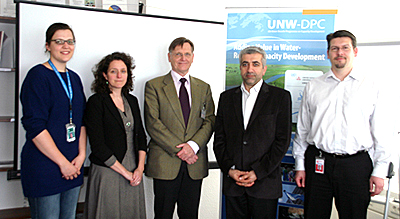KWR and UN Water cooperate in capacity building project in the water sector
KWR Watercycle Research Institute and the UN-Water Decade Programme on Capacity Development (UNW-DPC) signed a Framework of Cooperation agreement for a joint two-year research project. The project involves a study of existing and emerging capacity building networks in the water sector at local, national and international levels.
Recommendations to capacity builders
The study’s objective is to deliver key recommendations to capacity builders for the productive development of these networks. "I am very pleased to see the cooperation between UNW-DPC and KWR take shape", says dr. Ardakanian, director of UNW-DPC.
Visualization of relations and actors
"In the field of capacity development, networks and the relationships among actors are important", says Ardakanian. "We welcome KWR's expertise in the analysis of such networks, and the visualization of the relations of actors in the complex networks we are dealing with. Getting a better understanding of the networks in capacity development is an important prerequisite to identifying the needs for action."
Social network analysis
KWR is engaged in studying the functioning of networks in the water sector at local, national and international levels. "Our cooperation with UNW-DPC enables us to bridge science to practice: on the basis of social network analysis, we will examine capacity building in daily practices within the context of UN-Water", says prof. dr. Van Vierssen, CEO of KWR.
Wastewater and agriculture
In its first phase, the study will look at an emerging network which is dealing with the safe use of wastewater in Agriculture. This network is currently being built by means, for example, of regional workshops of capacity builders in African Francophone and Anglophone regions, West Asia, East Asia and Latin America.
Improvement of networking activities
"It is a complex topic", notes Ardakanian, "which needs to be addressed across disciplinary boundaries to be successful. We will evaluate how networks evolve in the framework of this project, and hope to come to conclusions on how to improve networking activities to effectively develop the necessary capacities and disseminate knowledge at the country level to promote the safe use of wastewater in agriculture".
Van Vierssen adds that "the unique situation of studying the emergence of the network, while it is taking shape, allows one to come up with recommendations that can possibly be used in actual practice."
Network map
Over the coming months, a social cognitive map of the emerging capacity building network on the safe use of wastewater in agriculture will be developed. Additionally, challenges and key messages for the further development of the network will be identified. Ardakanian is looking forward to exploring these options with KWR. “We have already had exciting discussions about possible fields of further joint engagement”, he says.
UNW-DPC is part of UN-Water, that strengthens coordination and coherence among United Nations entities dealing with issues related to all aspects of freshwater and sanitation. UNW-DPC was launched to strengthen capacity development activities and to support UN members and partners in their efforts to achieve the Millennium Development Goals related to water.
KWR Watercycle Research Institute assists society in optimally organising and using the water cycle by:
- creating knowledge through top-quality research;
- building bridges between science, business and society;
- promoting societal innovation by applying the best knowledge available
This news item was originally published on the website of
KWR.
More information
KWR Watercycle Research Institute
Mariëlle van der Zouwen marielle.van.der.zouwen@kwrwater.nl
Nieuwegein, the Netherlands
+ 31 30 60 69 641
www.kwrwater.nl
UN-Water Decade Programme on Capacity Development (UNW-DPC)
Bonn, Germany
+49 228 815 0652
www.unwater.unu.edu




